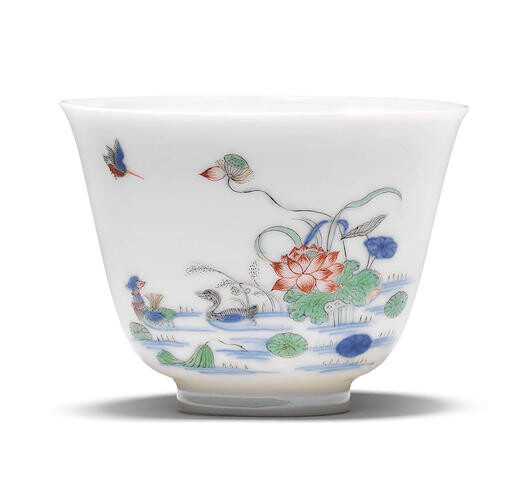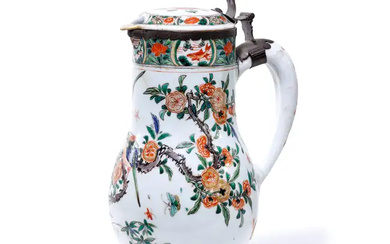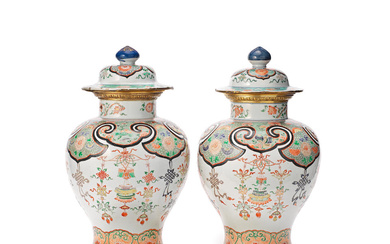A VERY RARE FAMILLE VERTE 'LOTUS' MONTH CUP
Kangxi six-character mark and of the period
Kangxi six-character mark and of the period
The finely potted vessel rising to a gently flaring rim, decorated to represent the sixth month with a pair of Mandarin ducks swimming in a lotus pond, with a kingfisher in flight above, the reverse with a poetic inscription: Gen shi ni zhong yu. Xin cheng lu xia zhu, 'The roots are like jade gleaming in the mud. The hearts contain pearls when dew has descended'. 4.9cm (1 8/9in) high.
清康熙 五彩「荷花」花神盃
青花「大清康熙年製」楷書款
Provenance:
Captain Charles Oswald Liddell (1854-1941)
Bluett & Sons Ltd., London
E. A. Parry (1879-1946), London, acquired from the above on 12 June 1929, and thence by descent
Published and Exhibited:
Bluett & Sons Ltd., The Liddell Collection of Old Chinese Porcelain, London, June 1929, p.11, no.100 or 101.
Captain Charles Oswald Liddell (1854-1941) was born in 1851 in Edinburgh. Having moved to China for family business, he worked there from 1877-1913. He married Elizabeth Birt in 1880 in the Anglican Cathedral in Shanghai, and thereby inherited Birt's Wharf there, expanding the business to Hangzhou, Tianjin and Harbin. He was joined by his brother John when the firm became known as Liddell Bros. In 1915 Liddell was Quartermaster and Hon. Captain in the 1st Battalion, The Monmouthshire Regiment, having served previously (and more adventurously) in the 'Shanghai Light Horse'. Liddell collaborated with A.W.Bahr in an exhibition in Shanghai in 1908 (he was Chairman of the North China branch of the Royal Asiatic Society), and in writing descriptions for it which were printed by A.W.Bahr, Old Chinese Porcelain and Works of Art in China, 1911. Charles Liddell had formed his collection, except for three pieces, while trading in China for nearly forty years. He purchased a number of them from two significant sources: the collection of Prince Chun, the last Regent of the Qing dynasty; and from the collection of the private secretary and adviser to Li Hongzhang. In May-June 1929 Bluett offered part of the collection for sale, publishing a catalogue of The Liddell Collection of Old Chinese Porcelain with 229 entries and eight illustrative plates, one of them unusually in colour.
來源:
Charles Oswald Liddell上尉(1854-1941)舊藏
倫敦古董商Bluett & Sons Ltd.
倫敦E. A. Parry(1879-1946)舊藏,於1929年6月12日購自上者,並由後人保存迄今
展覽著錄:
Bluett & Sons Ltd.,《Liddell收藏中國瓷器(The Liddell Collection of Old Chinese Porcelain)》,倫敦,1929年6月,頁11,編號100或101
利德爾上尉(Captain Charles Oswald Liddell),1854年生於愛丁堡。1877年移居中國,並為其家族企業一直在華工作至1913年。1880年,他與Elizabeth Birt在上海聖公會大教堂舉行婚禮,隨後接手了Birt家族在上海的平和碼頭,並將業務擴展到杭州、天津和哈爾濱等地。平和洋行的英文商號在其弟John加入後改為Liddell Bros。利德爾曾服役於上海英租界輕騎隊,並於1915年任蒙默思郡團一營軍需長官和榮譽上尉。1908年,利德爾與巴爾(A.W.Bahr,時任皇家亞洲學會華北分會秘書)合作於上海舉辦展覽,巴爾將展覽描述集結成《中國古瓷美術譜(Old Chinese Porcelain and Works of Art in China)》並於1911年出版。利德爾的藏品,除其中三件以外,全數在其在華經商的近四十年間入藏;其中一大部分來自兩個重要渠道:清朝末代攝政王醇親王載灃的藏品,以及李鴻章的私人秘書兼顧問的收藏。1929年5月至6月期間,倫敦古董商Bluett's出售了利德爾的部分藏品,並出版了《利德爾收藏中國瓷器(The Liddell Collection of Old Chinese Porcelain)》圖錄,收錄了共計229件藏品並附8張插圖,其中甚至包含一幅頗不尋常的彩色插圖。
Delicately potted porcelain cups, such as the present example, were known as 'Month cups' and were made at the Imperial kilns during the Kangxi reign. These vessels were painted in underglaze-blue and overglaze famille verte enamels in wucai style depicting individual flowers that designated each of the twelve months of the year.
The design format of these cups, incorporating a pictorial composition on one side and a poetic inscription ending in a seal mark on the other, was inspired by the long tradition in classical painting and was an innovation of the Kangxi period.
The poems inscribed on the 'Month cups' are all couplets from Tang dynasty poems. The Kangxi Emperor greatly admired Tang poems as demonstrated in ordering the compilation of all recorded Tang poems in 1705, on the 44th year of his reign. This project came into fruition under the leadership of the official Cao Yin, when the 'Complete Collection of Tang Poems' Quan Tangshu was published in 1706, including over 40,000 poems and a foreword written by the Kangxi Emperor himself; see R.Scott, For the Imperial Court. Qing Porcelain from the Percival David Foundation of Chinese Art, New York, 1997, pp.82-83. It is thus likely that these delicate 'Month cups', decorated with poems favoured by the Emperor, were made during the later period of the Kangxi reign, when the compendium of Tang poetry was published.
The twelve flowers painted on the 'Month cups' were selected following the traditions of the Flower Festival, which fell on the 15th day of the second month in the Chinese calendar, signifying the arrival of springtime and celebrated the birthday of all flowers. The Flower Festival was highly popular during the Qing dynasty. On this day, people made coloured paper flowers or decorated trees and plants with coloured ribbons. Memorials were also erected for the Gods of Flowers and can still be found in the Summer Palace in Jehol, attesting to the popularity of this festival amongst the members of the Qing Court. It is thus possible that the 'Month cups' were employed during the commemorative ceremonies for the Flower Gods.
A complete set of famille verte 'Month cups', Kangxi marks and period, also including a very similar cup to the present example in the Qing Court Collection, is illustrated in The Complete Collection of Treasures from the Palace Museum: Porcelains in Polychrome and Contrasting Colours, Hong Kong, 1999, pp.152-153, no.140; another complete set is in the Sir Percival David Collection, British Museum, London, illustrated by R.Scott, ibid., pp.82-83, no.23; and a further one is in the Metropolitan Museum of Art, New York, acc.no.50.145.267–.278.
A related famille verte 'lotus' Month cup, Kangxi mark and period, was sold at Christie's Hong Kong, 29 May 2013, lot 2257.
盃撇口,深弧腹,淺圈足。造型秀巧玲瓏,釉色鮮亮。器身外壁以五彩裝飾六月花神荷花,清新淡雅,芳華內蘊,超逸脫俗。附以青花楷書題詩「根是泥中玉,心承露下珠」,詩句末尾鈐一篆文「賞」字印,與同套其他花神盃無異。底署「大清康熙年製」青花雙行六字雙圈楷書款。
十二月花神盃為康熙官窯之首創,是康熙年間御窯廠燒製的時令酒具。其打破器物設計的傳統組合觀念,而取十二月令花神依月令之數為一套,是古人將詩、書、畫、印等文人高士精髓融會貫通並相互借鑒而創作出的藝術精品。
花神盃之上所題詩句多引自唐詩。康熙皇帝於康熙四十四年(1705年)下令搜羅唐詩合集,編纂《全唐詩》,「得詩四萬八千九百餘首,凡二千二百餘人」。曹寅奉旨編輯刊刻,康熙四十五年(1706年)書成,康熙皇帝親自撰序。見R.Scott著,《For the Imperial Court. Qing Porcelain from the Percival David Foundation of Chinese Art》,紐約,1997年,頁82-83。由此推測,這些題寫著皇帝喜愛詩句的花神盃,許是康熙後期《全唐詩》成書時燒製的。
代表農曆十二月份的月令花卉則為根據傳統花朝節的傳說選取。花朝節又稱花神節,《月令廣義》載,花神為「春夏長養之神」。清代以後,北方一般以農曆二月十五日為花朝節,節日期間,人們以五色彩紙或彩帶裝飾花枝。乾隆時期,於承德避暑山莊建萬匯總春之廟,即花神廟,其中供奉的十二花神與康熙十二月花神盃所繪花卉種類、順序一致。
完整十二件一套的花神盃傳世較少,北京故宮博物院館館藏一套清宮舊藏康熙五彩花神盃,可爲參考,詳見《故宮博物院藏文物珍品大系:五彩、鬥彩》,香港,1999年,圖版140。令可參倫敦大英博物館大維德基金會藏完整一套康熙五彩花神盃,收錄於R.Scott著,《For the Imperial Court. Qing Porcelain from the Percival David Foundation of Chinese Art》,紐約,1997年,頁82-83,編號23;以及紐約大都會博物館館藏一套,藏品編號50.145.267–.278。
參考一例清康熙五彩「荷花」花神盃,「大清康熙年製」楷書款,2013年5月29日售於香港佳士得,拍品編號2257。
View it on
Sale price
Estimate
Time, Location
Auction House
Kangxi six-character mark and of the period
Kangxi six-character mark and of the period
The finely potted vessel rising to a gently flaring rim, decorated to represent the sixth month with a pair of Mandarin ducks swimming in a lotus pond, with a kingfisher in flight above, the reverse with a poetic inscription: Gen shi ni zhong yu. Xin cheng lu xia zhu, 'The roots are like jade gleaming in the mud. The hearts contain pearls when dew has descended'. 4.9cm (1 8/9in) high.
清康熙 五彩「荷花」花神盃
青花「大清康熙年製」楷書款
Provenance:
Captain Charles Oswald Liddell (1854-1941)
Bluett & Sons Ltd., London
E. A. Parry (1879-1946), London, acquired from the above on 12 June 1929, and thence by descent
Published and Exhibited:
Bluett & Sons Ltd., The Liddell Collection of Old Chinese Porcelain, London, June 1929, p.11, no.100 or 101.
Captain Charles Oswald Liddell (1854-1941) was born in 1851 in Edinburgh. Having moved to China for family business, he worked there from 1877-1913. He married Elizabeth Birt in 1880 in the Anglican Cathedral in Shanghai, and thereby inherited Birt's Wharf there, expanding the business to Hangzhou, Tianjin and Harbin. He was joined by his brother John when the firm became known as Liddell Bros. In 1915 Liddell was Quartermaster and Hon. Captain in the 1st Battalion, The Monmouthshire Regiment, having served previously (and more adventurously) in the 'Shanghai Light Horse'. Liddell collaborated with A.W.Bahr in an exhibition in Shanghai in 1908 (he was Chairman of the North China branch of the Royal Asiatic Society), and in writing descriptions for it which were printed by A.W.Bahr, Old Chinese Porcelain and Works of Art in China, 1911. Charles Liddell had formed his collection, except for three pieces, while trading in China for nearly forty years. He purchased a number of them from two significant sources: the collection of Prince Chun, the last Regent of the Qing dynasty; and from the collection of the private secretary and adviser to Li Hongzhang. In May-June 1929 Bluett offered part of the collection for sale, publishing a catalogue of The Liddell Collection of Old Chinese Porcelain with 229 entries and eight illustrative plates, one of them unusually in colour.
來源:
Charles Oswald Liddell上尉(1854-1941)舊藏
倫敦古董商Bluett & Sons Ltd.
倫敦E. A. Parry(1879-1946)舊藏,於1929年6月12日購自上者,並由後人保存迄今
展覽著錄:
Bluett & Sons Ltd.,《Liddell收藏中國瓷器(The Liddell Collection of Old Chinese Porcelain)》,倫敦,1929年6月,頁11,編號100或101
利德爾上尉(Captain Charles Oswald Liddell),1854年生於愛丁堡。1877年移居中國,並為其家族企業一直在華工作至1913年。1880年,他與Elizabeth Birt在上海聖公會大教堂舉行婚禮,隨後接手了Birt家族在上海的平和碼頭,並將業務擴展到杭州、天津和哈爾濱等地。平和洋行的英文商號在其弟John加入後改為Liddell Bros。利德爾曾服役於上海英租界輕騎隊,並於1915年任蒙默思郡團一營軍需長官和榮譽上尉。1908年,利德爾與巴爾(A.W.Bahr,時任皇家亞洲學會華北分會秘書)合作於上海舉辦展覽,巴爾將展覽描述集結成《中國古瓷美術譜(Old Chinese Porcelain and Works of Art in China)》並於1911年出版。利德爾的藏品,除其中三件以外,全數在其在華經商的近四十年間入藏;其中一大部分來自兩個重要渠道:清朝末代攝政王醇親王載灃的藏品,以及李鴻章的私人秘書兼顧問的收藏。1929年5月至6月期間,倫敦古董商Bluett's出售了利德爾的部分藏品,並出版了《利德爾收藏中國瓷器(The Liddell Collection of Old Chinese Porcelain)》圖錄,收錄了共計229件藏品並附8張插圖,其中甚至包含一幅頗不尋常的彩色插圖。
Delicately potted porcelain cups, such as the present example, were known as 'Month cups' and were made at the Imperial kilns during the Kangxi reign. These vessels were painted in underglaze-blue and overglaze famille verte enamels in wucai style depicting individual flowers that designated each of the twelve months of the year.
The design format of these cups, incorporating a pictorial composition on one side and a poetic inscription ending in a seal mark on the other, was inspired by the long tradition in classical painting and was an innovation of the Kangxi period.
The poems inscribed on the 'Month cups' are all couplets from Tang dynasty poems. The Kangxi Emperor greatly admired Tang poems as demonstrated in ordering the compilation of all recorded Tang poems in 1705, on the 44th year of his reign. This project came into fruition under the leadership of the official Cao Yin, when the 'Complete Collection of Tang Poems' Quan Tangshu was published in 1706, including over 40,000 poems and a foreword written by the Kangxi Emperor himself; see R.Scott, For the Imperial Court. Qing Porcelain from the Percival David Foundation of Chinese Art, New York, 1997, pp.82-83. It is thus likely that these delicate 'Month cups', decorated with poems favoured by the Emperor, were made during the later period of the Kangxi reign, when the compendium of Tang poetry was published.
The twelve flowers painted on the 'Month cups' were selected following the traditions of the Flower Festival, which fell on the 15th day of the second month in the Chinese calendar, signifying the arrival of springtime and celebrated the birthday of all flowers. The Flower Festival was highly popular during the Qing dynasty. On this day, people made coloured paper flowers or decorated trees and plants with coloured ribbons. Memorials were also erected for the Gods of Flowers and can still be found in the Summer Palace in Jehol, attesting to the popularity of this festival amongst the members of the Qing Court. It is thus possible that the 'Month cups' were employed during the commemorative ceremonies for the Flower Gods.
A complete set of famille verte 'Month cups', Kangxi marks and period, also including a very similar cup to the present example in the Qing Court Collection, is illustrated in The Complete Collection of Treasures from the Palace Museum: Porcelains in Polychrome and Contrasting Colours, Hong Kong, 1999, pp.152-153, no.140; another complete set is in the Sir Percival David Collection, British Museum, London, illustrated by R.Scott, ibid., pp.82-83, no.23; and a further one is in the Metropolitan Museum of Art, New York, acc.no.50.145.267–.278.
A related famille verte 'lotus' Month cup, Kangxi mark and period, was sold at Christie's Hong Kong, 29 May 2013, lot 2257.
盃撇口,深弧腹,淺圈足。造型秀巧玲瓏,釉色鮮亮。器身外壁以五彩裝飾六月花神荷花,清新淡雅,芳華內蘊,超逸脫俗。附以青花楷書題詩「根是泥中玉,心承露下珠」,詩句末尾鈐一篆文「賞」字印,與同套其他花神盃無異。底署「大清康熙年製」青花雙行六字雙圈楷書款。
十二月花神盃為康熙官窯之首創,是康熙年間御窯廠燒製的時令酒具。其打破器物設計的傳統組合觀念,而取十二月令花神依月令之數為一套,是古人將詩、書、畫、印等文人高士精髓融會貫通並相互借鑒而創作出的藝術精品。
花神盃之上所題詩句多引自唐詩。康熙皇帝於康熙四十四年(1705年)下令搜羅唐詩合集,編纂《全唐詩》,「得詩四萬八千九百餘首,凡二千二百餘人」。曹寅奉旨編輯刊刻,康熙四十五年(1706年)書成,康熙皇帝親自撰序。見R.Scott著,《For the Imperial Court. Qing Porcelain from the Percival David Foundation of Chinese Art》,紐約,1997年,頁82-83。由此推測,這些題寫著皇帝喜愛詩句的花神盃,許是康熙後期《全唐詩》成書時燒製的。
代表農曆十二月份的月令花卉則為根據傳統花朝節的傳說選取。花朝節又稱花神節,《月令廣義》載,花神為「春夏長養之神」。清代以後,北方一般以農曆二月十五日為花朝節,節日期間,人們以五色彩紙或彩帶裝飾花枝。乾隆時期,於承德避暑山莊建萬匯總春之廟,即花神廟,其中供奉的十二花神與康熙十二月花神盃所繪花卉種類、順序一致。
完整十二件一套的花神盃傳世較少,北京故宮博物院館館藏一套清宮舊藏康熙五彩花神盃,可爲參考,詳見《故宮博物院藏文物珍品大系:五彩、鬥彩》,香港,1999年,圖版140。令可參倫敦大英博物館大維德基金會藏完整一套康熙五彩花神盃,收錄於R.Scott著,《For the Imperial Court. Qing Porcelain from the Percival David Foundation of Chinese Art》,紐約,1997年,頁82-83,編號23;以及紐約大都會博物館館藏一套,藏品編號50.145.267–.278。
參考一例清康熙五彩「荷花」花神盃,「大清康熙年製」楷書款,2013年5月29日售於香港佳士得,拍品編號2257。





